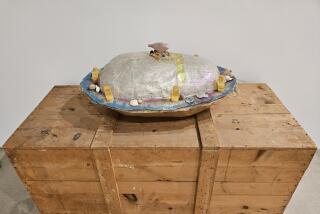O.C. Smith, 65; Jazz, Pop Singer Became Minister
- Share via
O.C. Smith, the onetime jazz singer in the Count Basie band who found popular success in the late 1960s with songs like “That’s Life” and the Grammy-award winning “Little Green Apples,” died Friday. He was 65.
Smith, who in later years left the entertainment business for a career in the ministry, died suddenly at his Ladera Heights home. The cause of death was not immediately clear, but he had been in generally good health, church officials said Friday. Smith officiated at a Thanksgiving service Thursday.
For the record:
12:00 a.m. Nov. 29, 2001 FOR THE RECORD
Los Angeles Times Thursday November 29, 2001 Home Edition Part A Part A Page 2 A2 Desk 1 inches; 35 words Type of Material: Correction
Smith obituary--In O.C. Smith’s obituary in Saturday’s California section, the name of Samuel Browne, an influential music teacher at Jefferson High School in Los Angeles, was misspelled. The name of the Wilshire Ebell Theatre was also misspelled.
Born Ocie Lee Smith in Mansfield, La., Smith moved to Los Angeles at an early age with his mother, a music teacher. Attending Jefferson High School, Smith learned music from the legendary teacher Samuel Brown, who instructed several top musicians over the years, including singer Ernie Andrews and saxophonists Dexter Gordon and Frank Morgan. Smith said his early influences were not singers but great bebop players like Dizzy Gillespie and Charlie Parker.
Smith joined the Air Force after high school and although assigned to the Air Police in Alaska, spent a good bit of time singing in a special services band.
He landed in New York City after his discharge and, over the next several years, found work in small clubs and in the Catskills singing ballads, blues, anything to pay the bills.
In early 1961, Smith auditioned successfully for Count Basie and joined the band, replacing the legendary Joe Williams.
Smith called Basie “an ideal leader.”
“I had a free hand to sing what I liked and I got to see a lot of the world over the next 2 1/2 years,” he said. Smith also recorded several songs for Roulette Records.
“Band experience is the best background any singer can hope for,” Smith later told Leonard Feather, the jazz critic and producer. “You learn about people everywhere.”
After Basie, Smith worked the club and concert circuit across the country, toured the Far East for several months and settled in Los Angeles afterward. Columbia soon signed him to a contract and expanded his repertoire.
He had fairly good success with the song “That’s Life,” which Frank Sinatra turned into gold years later and, in 1968, he attained his first commercial breakthrough record with Dallas Frazier’s story-song “The Son of Hickory Holler’s Tramp,” which became a big hit in Britain.
Then came his version of Bobby Russell’s “Little Green Apples,” winner of the Grammy as song of the year in 1968. A year later, Smith had another big R&B; single, “Daddy’s Little Man” in 1969, which hit No. 9 on the charts.
Smith recorded a number of other songs and albums that were not as successful. He ended his association with Columbia in 1974 but recorded off and on for various labels and continued working on the road.
In 1980, Smith’s life began to take a new direction after friends invited him to attend a Science of the Mind service at the Wilshire Ebel Theater.
“Dr. Joseph Murphy, whom I had heard speak that morning, became my teacher,” he told The Times in 1987. “I connected soon afterward with a presence that told me which direction I should take.”
Although Smith began studying for the ministry and graduated in January 1985, he wasn’t ready to give up full-time entertaining.
“I wanted the presence to reveal the right time to me,” he said. “Well, that summer I began to get the feeling that the moment had come to pull back a little on the reins of show business. The next step was to find a place where I could work regularly in the ministry.”
He found that place in the ballroom of a building near Los Angeles International Airport that had burned down a couple of years earlier and was being reopened.
In October 1985, with the Rev. O.C. Smith officiating, the City of Angels Church of Religious Science opened on Aviation Boulevard.
The church moved into its own building on Grosvenor Boulevard in Los Angeles six years ago.
Smith is survived by his wife, Robbie Gholson Smith; two daughters, Sherryn Smith and Bonnie Dykes; five sons, Ocie Lee Smith III, Kelly T. Smith, Robert F. Smith, Jesse Hayes IV and Frank Hayes; and 10 grandchildren.
Funeral arrangements are pending.
More to Read
The biggest entertainment stories
Get our big stories about Hollywood, film, television, music, arts, culture and more right in your inbox as soon as they publish.
You may occasionally receive promotional content from the Los Angeles Times.








